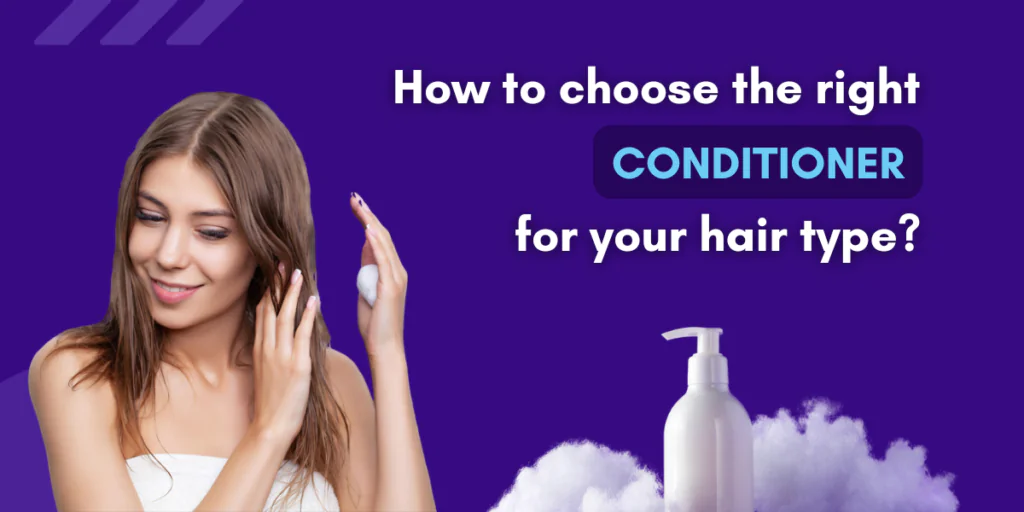Choosing the right conditioner for your hair type is key to having healthy, shiny, and manageable hair. With so many options, it’s easy to feel lost, but finding the right match for your unique hair needs can make all the difference. Let’s dive into what conditioners work best for various hair types commonly seen in India.
1. Fine or Thin Hair
If you have fine or thin hair, heavy conditioners can weigh it down, making it appear flat and greasy. Choose lightweight, volumizing conditioners that add body without adding weight. Ingredients like biotin, collagen, and keratin are particularly helpful for boosting volume in fine hair, giving it a fuller, bouncier appearance. Focus on applying conditioner mainly to the ends rather than the scalp to avoid buildup at the roots. This approach helps maintain a natural, airy look without flattening the hair.
2. Thick Hair
Thick hair often requires intense hydration to keep it smooth and manageable, as it can become dry easily. Opt for creamy, moisturizing conditioners that contain rich ingredients like shea butter, argan oil, or coconut oil. These conditioners help lock in moisture, reduce frizz, and add a healthy shine, making thick hair look more polished. Apply from mid-length to the ends and leave it on for a few minutes to allow the ingredients to fully penetrate and soften the hair.
3. Curly or Wavy Hair
Curly and wavy hair types tend to be more prone to dryness and frizz due to the natural shape of the strands. Look for curl-enhancing conditioners that provide ample moisture while defining curls. Ingredients like aloe vera, coconut oil, and proteins such as silk or keratin work wonders in taming frizz, enhancing curl definition, and adding softness. Use a wide-tooth comb to distribute the conditioner evenly through your curls to avoid breakage and create well-defined, bouncy curls.
4. Dry or Damaged Hair
If your hair feels brittle or shows signs of damage, deep conditioning can help restore strength and hydration. Look for conditioners with deeply nourishing ingredients like avocado oil, hydrolyzed proteins, and argan oil. These conditioners penetrate the hair shaft to provide long-lasting moisture and repair, helping to reduce split ends and prevent breakage. For an added boost, consider using a weekly hair mask in addition to your regular conditioner to repair and rejuvenate your hair.
5. Colored or Chemically Treated Hair
Color-treated or chemically processed hair needs extra care to maintain its health and vibrancy. Opt for color-protective conditioners that include UV filters and hydrating ingredients. Avoid conditioners with sulfates, as these can strip color and leave hair feeling dry. Conditioners labeled as “color-safe” or “for chemically-treated hair” are specifically formulated to lock in color, add moisture, and reduce breakage, helping to keep your color fresh and your hair strong.
6. Oily Hair or Scalp
If you struggle with an oily scalp, choose a lightweight conditioner that won’t add excess oil or weigh down your hair. Look for balancing formulas with ingredients like tea tree oil or aloe vera, which help control oil without over-drying. Focus on applying the conditioner only to the ends, avoiding the scalp area to keep hair feeling light and fresh.
7. Frizzy Hair
Frizz is a common issue in India’s humid climate, especially for those with naturally wavy or curly hair. Anti-frizz conditioners work to smooth the hair cuticle and lock in moisture, which helps minimize frizz throughout the day. Ingredients like argan oil or olive oil are excellent for combating frizz, while silicone-based ingredients can add a protective layer to keep your hair sleek and manageable. After conditioning, try air drying or using a microfiber towel to further reduce frizz.
8. Sensitive Scalp
For those with a sensitive scalp, finding the right conditioner is crucial to avoid irritation and itching. Choose hypoallergenic conditioners with soothing ingredients like chamomile or aloe vera, which can calm the scalp while providing gentle hydration. Avoid heavy fragrances and chemical-laden products that could trigger sensitivity, and look for labels indicating that the conditioner is suitable for sensitive skin.
9. Herbal or Ayurvedic Conditioners
For those who prefer natural products, Ayurvedic or herbal conditioners can offer gentle nourishment without the use of synthetic chemicals. Herbs like amla, bhringraj, and henna are known in Indian hair care traditions for their strengthening and conditioning benefits. Ayurvedic conditioners provide natural moisture and shine while supporting overall scalp and hair health, making them ideal for anyone looking to minimize chemical exposure in their routine.
Final Tips for Optimal Conditioning
To get the most out of your conditioner, avoid over-applying, as this can weigh down the hair or make it feel greasy. A coin-sized amount is usually enough for short hair, while longer hair may require a bit more. Ensure thorough rinsing to prevent any residue from building up, which can leave hair looking dull or feeling heavy. For extra hydration, consider using a leave-in conditioner, especially if you have dry or frizzy hair, as it can provide moisture throughout the day.
Selecting the right conditioner based on your hair type allows you to meet your hair’s specific needs, making it healthier, shinier, and more manageable. Adjust your conditioner choice based on your hair’s current state and the changing weather, and you’ll notice an improvement in texture, strength, and overall appearance.
Read also: 5 Simple Steps to Treat Dandruff at Home
Medical Disclaimer: This article is for informational purposes only and is not a substitute for professional medical advice. Always consult with a healthcare provider for personalized recommendations.

